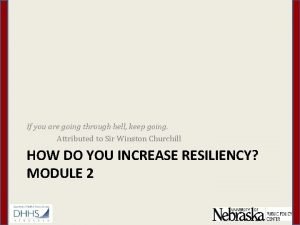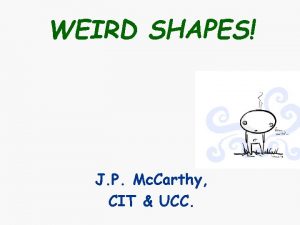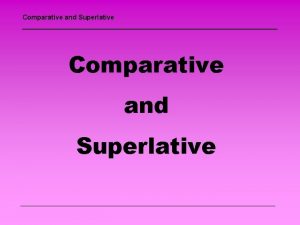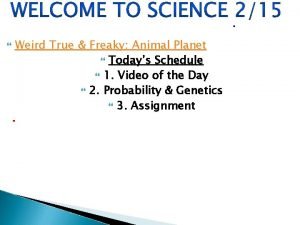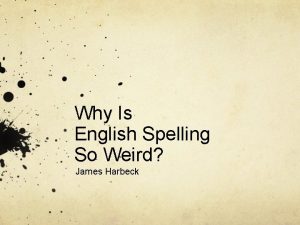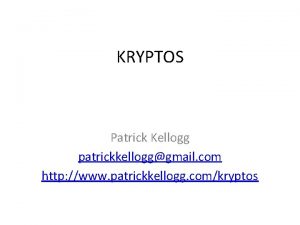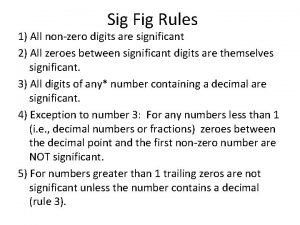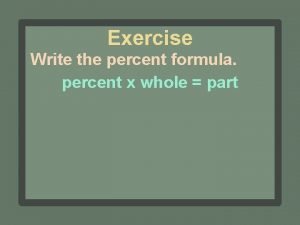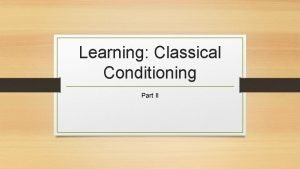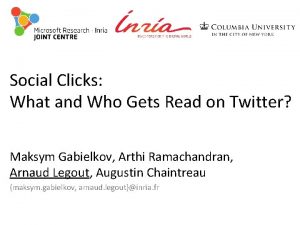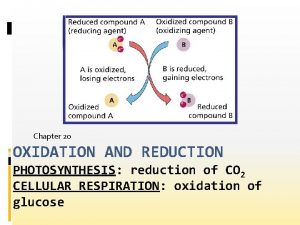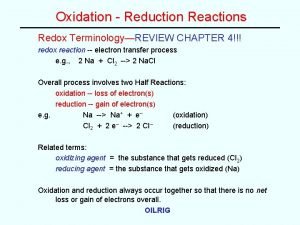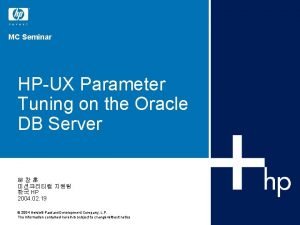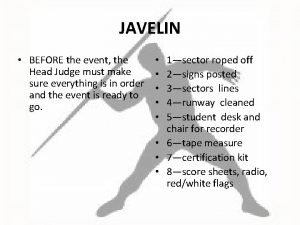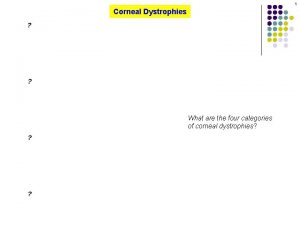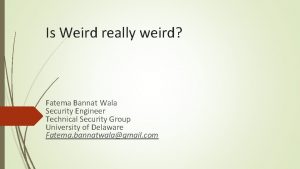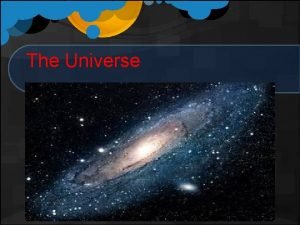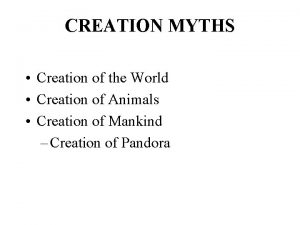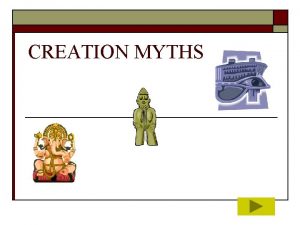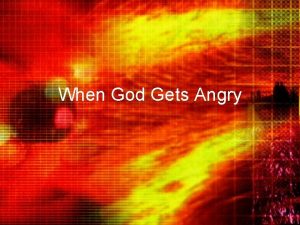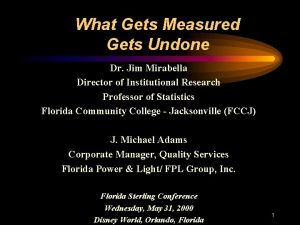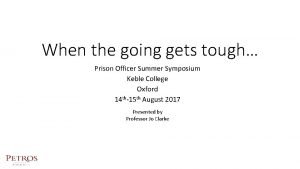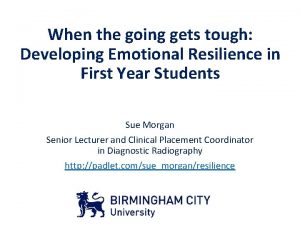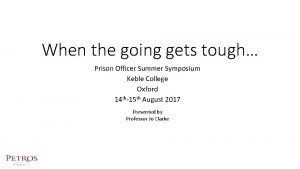The Going Gets Weird Creation of the Universe


































- Slides: 34

The Going Gets Weird Creation of the Universe Relying on Theory Now • We have a consistent picture of history of the universe back to the start of inflation • Assumed to occur around k. BT = 1016 Ge. V, t ~ 10– 39 s • This is also the scale at which grand unified theories (GUTs) become relevant • We have unified three of the forces: Strong, Electromagnetic, and Weak • Any signature of times before this gets wiped out due to inflation • All particle densities get reduced to near zero • Any curvature gets inflated away • Any inhomogeneities disappear due to inflation • We are relying completely on theory

Outline of History of Universe Time 10 -43 s 10 -39 s 10 -35 s 10 -13 s 10 -11 s 14 s 0. 4 s 1. 5 s 200 s 57 ky 370 ky 600 My 13. 8 Gy T or k. BT 1018 Ge. V 1016 Ge. V 1015 Ge. V 1500 Ge. V 160 Ge. V 150 Me. V 1. 5 Me. V 0. 7 Me. V 170 ke. V 80 ke. V 0. 76 e. V 0. 26 e. V 30 K 2. 725 K Events Planck Era; time becomes meaningless? Inflation begins; forces unified Inflation ends; reheating; forces separate; baryosynthesis (? ) Supersymmetry breaking, LSP (dark matter) Electroweak symmetry breaking Quark Confinement Neutrino Decoupling Neutron/Proton freezeout Electron/Positron annihilation Nucleosynthesis Matter-Radiation equality Recombination First Structure/First Stars Today

Quantum Gravity • Straightforward attempts to include gravity in with the other theories are largely unsuccessful • Standard approaches are perturbative • Gravity appears to be inherently non-perturbative • At low energies, gravitational forces between objects are completely irrelevant compared to other forces • Upcoming homework problem • But as the energies get very large, gravity becomes stronger • Same homework problem • Around 1018 Ge. V, the gravitational coupling becomes “strong” • At this point, if not before, we need a quantum theory of gravity • The Planck Era • A quantum theory of gravity would have quantum effects that influence the particles in spacetime, but also the very structure of spacetime itself • Sometimes, our words to describe things start to break down

Some Ideas for Quantum Gravity • We have two theories that seem to incorporate quantum mechanics and gravity consistently • String theory, now sometimes called M theory, says that all particles are actually tiny loops of a single fundamental string • Different particles correspond to different vibration modes on the strings • Only works in ten spacetime dimensions • Not necessarily a problem, in that extra dimensions could be “compactified, ” curled up into a tiny ball • Loop quantum gravity is a theory where there is no space or time, just “events” with no definite separation or • Time steps shorter than the Planck scale are meaningless • The dimensionality of spacetime must somehow arise spontaneously from these fundamental interactions • At present, neither theory has produced any predictions that can be checked against experiment

The Planck Era • Assume the universe is still radiation dominated • Substituting the energy 1018 Ge. V, this would be at • This is only about a factor of 100 in energy above the start of inflation • Given the sloppiness of our estimates, there may be little or no gap between the Planck era and inflation • Some complicated possibilities: • Whole universe might be inflating, with only little pockets escaping to make universe • Entire universe might quantum tunnel from nothing • Time might become meaningless • Universe may have had a “bounce” at the Big Bang

Chaotic Inflation/Eternal Inflation • Universe may have begun in inflationary era, everywhere • Everything is expanding, very fast, everywhere • A small pocket manages to escape and start forming a universe • We’ll have to get slow roll, or something, to make it continue inflating enough • This pocket grows to make observable universe • There will be other bubble universes that form • Different bubbles will not collide – the universe is expanding too fast • It is quite possible that there is more than one way to escape from inflation • Different “universes” could have different fundamental constants • Only a few of them may have intelligence • The vast majority of the universe is always inflating

The String Landscape: • String theory is incredibly complex • No one understands it • Just like in the electroweak theory, the minimum (the vacuum) can be non-trivial • However, the potentials (which determine those minima) are effectively infinite dimensional • The number of minima – which determines the apparent laws of physics – is very, very large • The “String Landscape” • There may be many, many minima • Many possible universes with apparently different laws of physics • Some estimates give ~ 10100 to 101000 possibilities

The Ultimate Free Lunch • Around the time of the Planck Era, particles have energies around • The age of the universe is 10 -43 s • Multiplying these numbers, we have • According to quantum mechanics, you can violate conservation of energy, provided • You can create these particles out of nothing! • It is quite possible that we can create the whole universe out of nothing! • Even spacetime itself is created • There isn’t even spacetime before the big bang; there’s no space or time

Quantum Uncertainty in Time? • Under ordinary circumstances, events in time are pretty clearly ordered • Big Bang BEFORE Revolution War BEFORE Civil War BEFORE now • In a quantum theory of gravity, spacetime should itself have random fluctuations on the Planck scale • Quantum foam structure of spacetime • Which events happen ambiguous on scale of 10 -43 s • It therefore becomes meaningless on this scale to say which event caused which event • The universe could cause itself to come into existence

Big Bang or Big Bounce? • One possibility that has been discussed extensively is that there was another era of the universe where it was collapsing before the big bang. • This theory is called the Big Bounce • As demonstrated by Hawking, this is inconsistent with Einstein’s General Theory of Relativity • But not necessarily inconsistent with quantum gravity • In particular, this seems to be the current prediction of Loop Quantum Gravity • I don’t know (and not sure if anyone does) if the previous half of the universe represents a time-reversed universe, where entropy increase backwards, or a more conventional universe where entropy increases forwards

For This May We Be Truly Thankful. . . Is the Universe Fine Tuned for Intelligence? • The universe we see around us should be explainable in terms of just a few things • The standard model of particle physics predicts how particles interact with each other • These include 18 apparently arbitrary parameters • Lepton masses, quark masses, fundamental couplings, mixings • In addition, there are some things in particle physics we don’t know • Neutrino masses and mixings • There also various cosmological inputs that we don’t understand • Initial density, cosmological constant, etc. • Some of these surprisingly favorable to life • Luck? Design?

Some Spurious Issues … • • Many authors have pointed out how fortunate the Earth is that it allows life to exist Low mass stars produce deadly flares that could destroy life High mass stars live too short a time for life to evolve The Sun is just the right size Stars near the center of galaxies have too many unhealthy supernovae nearby Stars near the edge have too few “metals” to make life – probably The Sun is in just the right zone Many stars have planets in eccentric orbits • Alternately cold and hot • We got lucky – fairly stable circular orbits • With 1012 stars in each of 1015 galaxies in the known universe, it is not surprising we occasionally get lucky • The chance that you win the lottery is small • The chance that someone wins the lottery is large • Only those that win the intelligent life lottery question how they got so lucky

The Value of • • • We previously found that the value of at the time of the GUT scale is close to 1 What would have happened if this were not the case? If GUT > 1 + 10 -52, universe would reach peak size and then recollapse to a point If GUT < 1 – 5 10 -51, then universe would grow too diffuse for structure to form But our value is just right

Should We Take This Coincidence Seriously? • We need: • We have: • This is far better tuned than we need to produce intelligent life • Suggests that something caused this to happen • I am not suggesting that this agent is necessarily intentional • Indeed, we have a theory that naturally predicts this result • Inflation • And other theories I don’t know as much about • Odds are the flatness of the universe is not a lucky coincidence

The Value of • The mass density of empty space is technically a subject for particle physics • This number could be any number between – and + • If > +500 u/m 3, the universe would begin exponential growth before structure formation • If < – 2 u/m 3, universe reaches maximum size and then collapses before now • Actual value is • We have no idea what the value of “should be” • Therefore it’s hard to tell how “lucky” this is

What Can Particle Physics Predict for ? (1) • Recall, for example, the formula for the energy density of the electromagnetic radiation • The factor nk is the number of photons in the state with wave number k • Though it’s not obvious, each photon state is really a harmonic oscillator • The states for the harmonic oscillator have energy • We have missed the ½ term • Normally ignored, since the zero of energy is irrelevant • But not irrelevant when considering gravity • There is a contribution to the energy that exists even for empty space • Zero point energy • This leads to a contribution to the mass density in empty space

What Can Particle Physics Predict for ? (2) • This integral diverges, yielding infinity • However, this assumes that the physics we understand works up to E = • We expect, at most, this to work up to the scale where we expect quantum gravity to cut in, the Planck Energy: • So let’s put in a corresponding cutoff in the scale: • There also contributions from other particles, and, in principle, an arbitrary constant • These other terms are in most cases unknown and may be of either sign

How Lucky Are We on ? • Actual value is: • To make things work, we need • Smaller values generally work better • Looks like we got lucky by about a factor of about 10120 • Like winning the lottery every day for three weeks • Had the number been zero, it would be reasonable to imagine that it came about because of something forcing it to be zero • Much as inflation explains why the universe is nearly flat • But there may be logical reasons why it is so small* • Many ideas have been proposed; most are, at present, untestable *Eric D. Carlson and W. Daniel Garretson, “Could there be Something Rather than Nothing? ”, Phys. Lett. B 315, 232 (1993).

The Neutron-Proton Mass Difference • The proton and neutron are very close in mass • Suppose the neutron masses had been a little different? • If the neutron mass were 0. 79 Me. V lower, then we would have mp + me > mn • Hydrogen atoms would be unstable • After recombination, all the protons would disappear • Stars, planets, etc. , as we know them would not exist • If the neutron mass were 1. 44 Me. V higher, then deuterium would be unstable • Deuterium would not form in stars • Nuclear fusion would not proceed • Once again, it looks like we got lucky • About 1 part in 1000 lucky

What Causes the Neutron-Proton Mass Difference? • We now know protons and neutrons are actually made of quarks • About 98% of the mass/energy of these particles comes from strong interactions • The same for protons and neutrons • The remaining 2% comes from a combination of • Up quark (~5 Me. V) and down quark (~10 Me. V) mass • Electrostatic interactions • Favors the neutral neutron by about 4 Me. V • So, in round numbers, our neutron and proton masses are about • Hence the real question is why down minus up is between 4 and 6 Me. V • And now it doesn’t look so ridiculously lucky

The Importance of Carbon to Life • Many elements are critical to life as we know it • All life depends critically on H, C, N, O, S, P • And probably others • Hydrogen was produced in the big bang • Carbon is produced in stars • All other elements are made out of carbon • Almost all complex chemicals contain carbon as a backbone element • Probably because of its four covalent bonds • Not only is carbon critical to life on Earth, it is probably critical to almost any conceivable chemistry-based life

The Triple- Reaction is Hard • Carbon is produced by the Triple- interaction • Step 1 produces unstable 8 Be • Step 2 produces 12 C • The first step would be very difficult to do, except we are at high temperatures • T ~ 2 108 K corresponds to k. BT = 17. 2 ke. V • Only the tininess of the energy required makes this conceivable • Normal nuclear interactions would involve several Me. V of energy • The second step should be heavily suppressed, because making the photon makes it difficult • Based on the fact that 12 C was produced in stars, Fred Hoyle predicted there must be an intermediate excited state with the correct energy • It was shortly thereafter discovered • This double coincidence allows carbon to be formed • And hence life to exist

How Coincidental Is It? • Is it such a big coincidence that 8 Be is barely unstable? • Not surprising that it’s kind of close – after all 8 Be is mostly just a bound state of two 4 He • Is it such a big coincidence that there is a resonance near the right energy for 12 C? • This is hard to figure out, so we don’t really know how to calculate the resonance energy • But there are several other resonances, so we have several chances for a coincidence • And the match is only 5% or so • Only a little lucky

Cosmic Philosophy Is the Universe Fine Tuned for Intelligence? • We have several apparent coincidences: • Omega started ridiculously close to 1 • Can be explained by inflation or other theories • The density of empty space is very low • Not well explained, but there are some potential explanations • The neutron/proton mass difference is right in the correct range • When you understand quarks, this is less coincidental than it appears • The triple-alpha reaction seems to have two coincidences that make it work • Unclear how much of a coincidence this is • There are others I don’t know as much about … • Some of them we can already partly explain in terms of known physics • Others we have potential explanations, but we don’t know if they are right

What Remains to be Explained? Things we’ve resolved: • Why the universe has the fraction of hydrogen/helium, etc. we see • The nature of the cosmological background radiation • How all the structure in the universe formed from initial perturbations Things we’ve got good guesses on: • Where the dark matter came from • Why = 1 • Why the universe is nearly uniform • The likely causes of initial perturbations • Why there’s more matter than anti-matter in the universe Things we don’t really know: • Where the universe came from • Why the vacuum energy density is so low • Why the various particle physics parameters are what they are

The Best of All Possible Worlds? • If some of the parameters were very different than they are, then life as we know it would be impossible • But for some of the parameters, some other type of intelligence might be possible • For example, if parameters were different, maybe we could make 12 C in primordial nucleosynthesis • Don’t need to make it in stars • The real question is, if we change these parameters a lot, would intelligence still form? • Answering this would require redoing all of physics (and chemistry, and biology) from scratch • We are not currently capable of doing it • Bottom line – for many of the parameters, we can’t tell if they are fine tuned for life

Are These Variables Truly Variable? • If there is truly one simple theory with no or few adjustable parameters, then it may be that the “coincidences” are inevitable • As if math is fine tuned for life • Until we have such a theory, we really can’t say how coincidental these things are The Anthropic Principle • Science involves repeatable experiments • Other sciences, even history, can in principle be subject to verifiable predictions • In the case of the universe as a whole, we only get one experiment to see if it produced intelligent life • We already know the answer • And if it didn’t produce life, we wouldn’t even be asking the question • Some philosophers suggest we should follow the anthropic principle: • “The anthropic principle is a philosophical consideration that observations of the Universe must be compatible with the conscious and sapient life that observes it. ”

Multiple Universes • What do we mean by multiple Universes? – The Universe is the totality of existence that we are aware of or can be aware of us – If there are places that are real, but we can’t see them, they are other Universes Reasons to believe in multiple universes with different physical constants • Chaotic/eternal inflation – Different portions of the universe may look very different • Spontaneous appearance of multiple universe – If our universe came from nothing, why not others? • Many Worlds Interpretation of quantum mechanics – If correct, then everything happens

Multiple Universes and the Anthropic Principle • According to inflation, the universe is much bigger than the portion we can see • The number of stars could be much bigger then the known 1027 stars • If life is super-rare, it doesn’t matter, it’s still inevitable • In some pictures of inflation, there a large or infinite number of “bubble universes” that escape from inflation • The apparent laws of physics could be very different in each of them • Recall that in string theory, for example, the number of possibilities could be huge • 10100 to 101000 might be typical possibilities • So intelligence might actually be very rare • But only in those universes where there are intelligences do we wonder why the universe is fine-tuned for intelligence • In this view, there is no surprise • Only universes where intelligence is possible are worthy of consideration

Spontaneous Creation of the Universe • It is possible that the universe we see was created from nothing • Indeed, this seems likely • If it happened once, it could happen again • The universes would not in any sense be connected, so they don’t even have a time ordering • No particular reason that the different universes would have the same physical constants

Quantum Mechanics and Probability • In the everyday world, we think of probability as expressing our ignorance ? 5

Copenhagen Interpretation of Q. M. • Some processes are inherently quantum uncertain • All possibilities actually occur • Until a measurement occurs ? 5

Many Worlds Interpretation of Q. M. • All possibilities actually occur • Even after a measurement occurs • In many cases, the different possibilities become so disconnected, they effectively become separated universes ? • We are only cognizant of one 1 2 3 4 5 6

Do People Take This Seriously? • Many famous physicists, and a lot of obscure ones, believe in the Many Worlds Interpretation Murray Gell. Mann Stephen Hawking Steven Weinberg Richard Feynman World Expert on 11/11/11
 Lve
Lve Going through hell
Going through hell Cit stands for
Cit stands for Fat comparative adjectives
Fat comparative adjectives Hiatal hernia nausea
Hiatal hernia nausea Charles f parham
Charles f parham Tudors food menu
Tudors food menu Weird restaurants around the world
Weird restaurants around the world Mrs foul
Mrs foul Weird true and freaky
Weird true and freaky Nil nisi bonum pronunciation
Nil nisi bonum pronunciation 1 complete the sentences
1 complete the sentences Ryan my weird school
Ryan my weird school Kryptos passage 4
Kryptos passage 4 Weird s
Weird s Comunitatea amish
Comunitatea amish Weird wild wacky personality disorders
Weird wild wacky personality disorders Weird pronouns
Weird pronouns What new title does macbeth receive early in act one
What new title does macbeth receive early in act one Waitress gets $4 000 tip
Waitress gets $4 000 tip A person weighing 600 n gets on an elevator
A person weighing 600 n gets on an elevator All about food chains
All about food chains Molly was ecstatic when she learned her family
Molly was ecstatic when she learned her family What gets dissolved
What gets dissolved The atlantic ocean gets about 3-5 ______ wider each year.
The atlantic ocean gets about 3-5 ______ wider each year. The sluggard craves and gets nothing
The sluggard craves and gets nothing Clickashare
Clickashare Curious george gets a talker
Curious george gets a talker What gets oxidized in photosynthesis
What gets oxidized in photosynthesis Oxidized meaning
Oxidized meaning Hp-ux eos
Hp-ux eos Management myths in software engineering
Management myths in software engineering Javelin tow
Javelin tow Corneal dystrophy mnemonic
Corneal dystrophy mnemonic Super turkey health
Super turkey health

